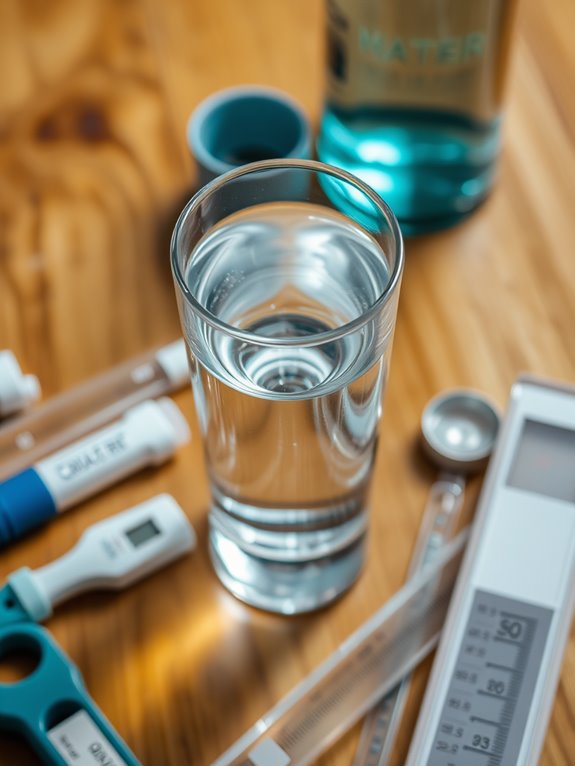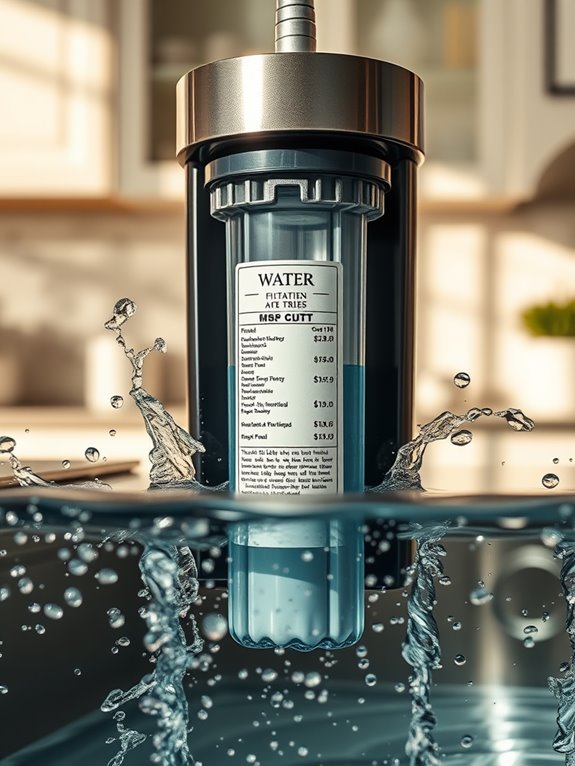Water filtration systems are necessary for ensuring your drinking water is safe. They help remove harmful contaminants like bacteria, chemicals, and heavy metals that can negatively impact your health. With options like reverse osmosis and activated carbon filters, you can improve taste and quality while reducing plastic waste. Although there are initial costs and maintenance to evaluate, the long-term health and environmental benefits often outweigh them. Let’s explore more about how these systems can fit into your lifestyle.
Understanding Water Quality

When you think about water quality, it’s vital to recognize that it directly impacts your health and daily life.
Contaminants like bacteria, chemicals, and heavy metals can lurk in your tap water, affecting everything from your drinking habits to your cooking.
Poor water quality can lead to health issues, including gastrointestinal problems and long-term diseases.
You might notice changes in taste, smell, or appearance, signaling potential problems.
Regular testing of your water is essential to guarantee it meets safety standards.
You might also be interested in: What Does a Plumber do on Daily Basis?
Types of Water Filtration Systems
Now that you understand water quality, let’s explore the different types of water filtration systems available.
You’ll find options like reverse osmosis systems, activated carbon filters, and UV water purifiers, each offering unique benefits.
Choosing the right one can greatly improve your water’s safety and taste.
Reverse Osmosis Systems
Reverse osmosis systems are among the most effective water filtration methods available today. They use a semipermeable membrane to remove impurities, providing you with cleaner drinking water.
Here are three key benefits to evaluate:
- Contaminant Removal: They can eliminate up to 99% of common contaminants, including lead, chlorine, and fluoride.
- Improved Taste: By removing unwanted minerals and chemicals, your water tastes fresher and more appealing.
- Cost-Effective: Once installed, these systems can save you money on bottled water and reduce plastic waste.
If you’re serious about water quality, a reverse osmosis system might be the right choice for you.
Activated Carbon Filters
Activated carbon filters are a popular choice for improving water quality due to their ability to effectively remove contaminants. These filters use activated carbon, which adsorbs impurities like chlorine, sediment, and volatile organic compounds. You can find them in various forms, including countertop units, pitcher filters, and under-sink systems.
| Type | Pros | Cons |
|---|---|---|
| Countertop | Easy to install | Takes up counter space |
| Pitcher | Portable | Limited capacity |
| Under-sink | Space-saving | Requires plumbing work |
| Whole-house | Filters all water | Higher upfront cost |
| Showerhead | Convenient for bathing | Limited filtration |
You might also be interested in: What is Potable Water Plumbing?
UV Water Purifiers
When considering effective ways to purify water, UV water purifiers stand out for their ability to eliminate harmful microorganisms without the use of chemicals.
These systems use ultraviolet light to inactivate bacteria, viruses, and other pathogens, ensuring your water is safe to drink.
Here are three benefits of UV purifiers:
- Chemical-Free: They don’t rely on potentially harmful chemicals.
- Fast Processing: UV purifiers can treat water quickly, making them ideal for homes and businesses.
- Minimal Maintenance: With few moving parts, they require less frequent upkeep compared to other filtration systems.
Consider adding a UV purifier for cleaner, safer water.
Don’t miss out on related tips: Read this next: Anaerobic Water Treatment Systems: Benefits, Process, and Applications
Health Benefits of Water Filtration

When you use a water filtration system, you’re not just improving the quality of your water; you’re also removing harmful contaminants that could affect your health.
Plus, you’ll notice a significant enhancement in taste and odor, making your drinking experience much more enjoyable.
Let’s explore how these benefits can impact your daily life.
Improved Water Quality
Many people underestimate the profound impact of water filtration on their health.
When you choose a filtration system, you’re investing in improved water quality that can benefit you greatly.
Here are three key advantages:
- Enhanced Taste: Filtered water tastes fresher, making you more likely to stay hydrated.
- Better Digestive Health: Clean water aids digestion and helps your body absorb nutrients effectively.
- Boosted Immune System: Drinking high-quality water supports your immune system, helping fend off illnesses.
Removal of Contaminants
While you may not see them, contaminants lurk in your tap water, posing potential health risks. Harmful substances like lead, chlorine, and bacteria can affect your well-being over time.
By using a water filtration system, you can effectively remove these impurities, providing you with cleaner, safer drinking water. This means fewer worries about waterborne illnesses and other health issues related to contamination.
Investing in a filtration system not only protects your health but also enhances your family’s overall quality of life. Prioritizing clean water is a simple yet impactful step towards maintaining your well-being and ensuring a healthier environment at home.
Enhanced Taste and Odor
Clean water not only safeguards your health but also enhances your drinking experience.
With a water filtration system, you’ll enjoy better-tasting water free from unpleasant odors.
Here are three benefits you can expect:
- Improved Flavor: Filtration removes chlorine and other chemicals that can make tap water taste off-putting.
- Odor Reduction: Say goodbye to musty or metallic smells, ensuring your water is invigorating.
- Enhanced Hydration: When you enjoy the taste of your water, you’re more likely to stay hydrated throughout the day.
Investing in a filtration system elevates your water consumption to a whole new level.
You might also be interested in: Are Continuous Flow Hot Water Systems Good? Benefits and Considerations
Environmental Impact of Filtration Systems
As you consider the environmental impact of water filtration systems, it’s important to recognize both their benefits and potential drawbacks.
On one hand, these systems can reduce plastic waste by minimizing bottled water consumption, promoting sustainability. They also help conserve water by filtering and reusing what you have.
However, some filtration systems rely on electricity and may produce waste, such as used filters that end up in landfills. It’s vital to choose systems designed for minimal waste and energy use.
Cost Considerations for Water Filtration

Choosing a water filtration system involves more than just environmental considerations; cost plays a significant role too. Before making a decision, consider these financial aspects:
- Initial Investment: The price of the filtration unit varies widely, so find one that fits your budget.
- Maintenance Costs: Factor in filter replacement and upkeep; some systems require frequent maintenance that adds up.
- Long-term Savings: Calculate potential savings from reduced bottled water purchases and lower plumbing repairs from contaminants.
Making the Right Choice for Your Home
How do you determine the best water filtration system for your home? Start by evaluating your water quality through testing kits or local reports.
Identify specific contaminants you want to remove, like chlorine, lead, or bacteria.
Next, consider your household size and daily water usage, as this affects the system’s capacity.
Research different filtration methods—activated carbon, reverse osmosis, or UV treatments—and weigh their pros and cons.
Finally, evaluate installation and maintenance requirements, along with your budget.
Conclusion
To summarize, having a water filtration system is like adding a safeguard to your health. With the right system, you not only improve the taste of your water, but you also reduce contaminants that could harm your family. While there are costs and environmental factors to reflect upon, the benefits often outweigh them. Take the time to evaluate your water quality and choose a system that suits your home, ensuring every sip is as pure as nature intended.

I’m Allen Kim, the chief editor of plumbinginto. I am a mid level plumber and assign to an local firm over 4 years of experience. During the working period, most of my experience is related to the house plumbing. I learned about the thing, when working with most experienced people in this sector, one must be as good as the inspector or better with knowledge of the project as well as the practical aspects of plumbing industry.